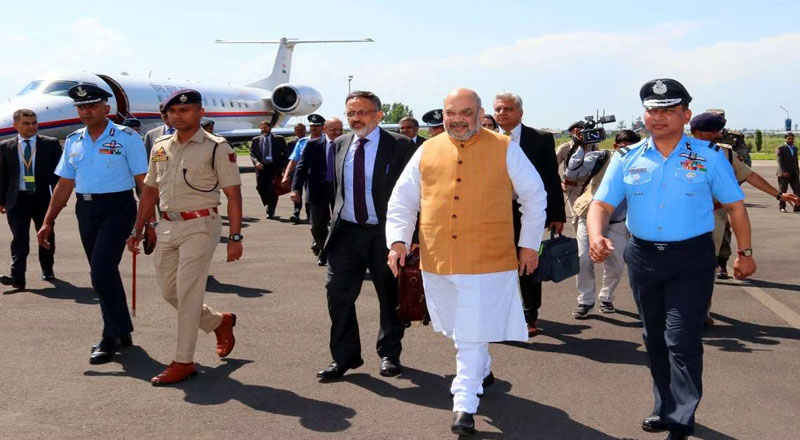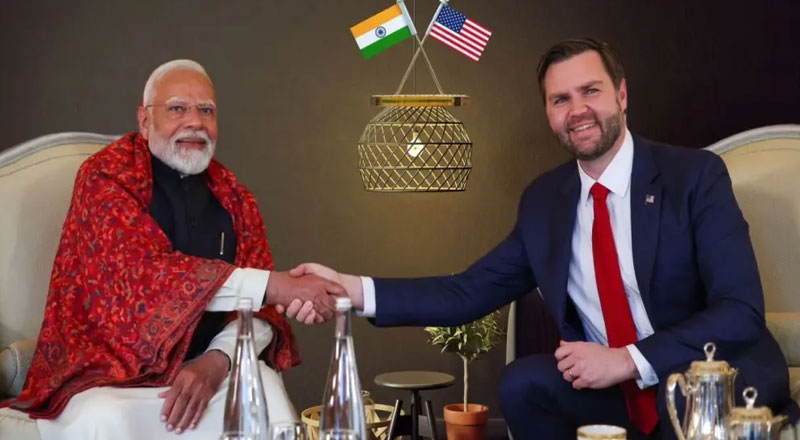My dear countrymen, Namaskar. Welcome to the 110th episode of ‘Mann Ki Baat’. As always, this time too we have received a lot of your suggestions, inputs and comments. And like always, this time as well, selecting topics to be included in the episode, is a challenge. I have received many an input, one better than the other, full of positivity. These comprise due mention of many countrymen who are striving to improve the lives of others by becoming a ray of hope for them.
Friends, just after a few days on the 8th of March, we will celebrate ‘Women’s Day’. This special day is an opportunity to salute the contribution of woman power in the developmental journey of the country. Mahakavi Bharatiyar ji has said that the world will prosper only when women get equal opportunities. Today the woman power of India is touching new heights of progress in every field. Who would have thought till a few years ago that in our country, women living in villages too would fly drones? But today this is becoming possible. Today there is so much discussion about Drone Didi in every village… “Namo Drone Didi, Namo Drone Didi”, adorns everyone’s lips. Everyone is talking about them. A big curiosity has arisen and that is why, I also thought that this time in ‘Mann Ki Baat’, why not talk to a NaMo Drone Didi! Namo Drone Didi Sunita ji, who’s from Sitapur, Uttar Pradesh, is at the moment connected with us. Let’s speak to her.
Call-1.
Modi ji: Sunita Devi ji, Namaskar.
Sunita Devi: Namaste Sir.
Modi ji: Okay Sunita ji, at the outset, I wish to know about you; I want to know about your family. Tell me a bit.
Sunita Devi: Sir, there are two children in our family, I’m there, husband is there; my mother is there.
Modi ji: What has your education been Sunita ji?
Sunita Devi: Sir, it is BA (Final).
Modi ji: And what is the nature of work in the household?
Sunita Devi: Work related to agriculture, farming etc.
Modi ji: Okay Sunita ji, how did your journey of becoming a Drone Didi start? Where did you get the training, what kind of changes took place; I want to know, right from the beginning.
Sunita Devi: Ji Sir, the training was done in our Phulpur IFFCO company in Allahabad… and we got training there itself.
Modi ji: So till then had you ever heard about drones?
Sunita Devi: Sir, I had not heard about that… though we had seen once, at the Krishi Vigyan Kendra in Sitapur… we had seen it there… for the first time we had seen a drone there.
Modi ji: Sunita ji, I want to understand that right since you went there on the first day.
Modi ji: You must have been shown a drone on the first day… then something must have been taught to you on the board; taught on paper, then taken to the field for practice… what all must have happened! Can you explain to me with complete description?
Sunita Devi: Ji-Ji Sir. On the first day sir we all went there… our training started from the second day. First the theory was taught and then the class went on for two days. In the class, what are the parts of a drone, how and what you have to do – all these things were taught in theory. On the third day, sir, we had our paper… after that sir, there was a paper also on the computer… meaning, first the class was conducted and then the test was taken. Then practical was conducted, that is, how to fly the drone, how to handle the controls, everything was taught in practical mode.
Modi ji: Then what work would the drone do, how was that taught?
Sunita Devi: Sir, the drone will work, when the crop is growing. During the rainy season or anything like that…
Sunita Devi: well, there is a problem during the rains and we are not able to enter the fields to harvest the crops, so how will the farmhands go inside! Then through this, the farmers will benefit a lot and they will not even have to enter the fields. We can do the work done by labourers using our drone, we can do our work by standing on the farm boundary, we will have to be careful if there are any insects inside the field, there won’t be any problem and the farmers are also feeling very good. Sir, we have sprayed over 35 acres so far.
Modi ji: So do farmers also understand that it has benefits?
Sunita Devi: Yes Sir, the farmers feel very satisfied… they are saying that they are feeling very good. Time is also saved, you look after all the facilities yourself… water, medicine, everything is kept together and we just have to come to the farm and note from where to where the farm is… and I finish the entire work within half an hour.
Modi ji: So other people would also be coming over to see this drone?
Sunita Devi: Sir, there is a huge crowd… many people come to see the drone. Those who are big farmers, they also take our number, saying that we would also be called for spraying.
Modi ji: Okay. Because I have a mission to make Lakhpati Didi… if sisters across the country are listening today, a Drone Didi is talking to me for the first time. What would you like to say?
Sunita Devi: Just like today I am the only Drone Didi, thousands of such sisters should come forward to become Drone Didi like me and I will be very happy that when I am alone, thousands of other people will stand with me… it will feel very good that we’re not alone… many people are with me known as Drone Didis!
Modi ji: Well Sunita ji, many congratulations to you from my side. This Namo Drone Didi is becoming a great means to modernize agriculture in the country. My very best wishes.
Sunita Devi: Thank you, Thank you Sir.
Modi ji: Thank you!
Friends, today there is no region in the country where the woman power has lagged behind. Another area where women have demonstrated their leadership abilities is natural farming, water conservation and sanitation. The suffering, the pain and the hardships that our mother earth is facing due to chemicals – the Matrishakti of the country is playing a big role in saving our mother earth. Women are now extending natural farming in every corner of the country. Today, if so much work is being done in the country under the ‘Jal Jeevan Mission’, water committees have had a big role to play in it. The leadership of these water committees lies only with women. Apart from this, sisters and daughters are making all-out efforts for water conservation. One such lady, Kalyani Prafulla Patil ji is on the phone line with me. She is a resident of Maharashtra.
Come let’s talk to Kalyani Prafulla Patil ji and know about her experience.
Call 2
Prime Minister – Kalyani ji, Namaste.
Kalyani ji – Namaste Sir Ji, Namaste.
Prime Minister – Kalyani ji, first of all tell us about yourself, your family, your work.
Kalyani ji – Sir, I am MSC Microbiology and at home I have my husband, my mother-in-law and my two children and I have been working in my Gram Panchayat for three years.
Prime Minister – And then you got engaged in farming work in the village? Since you have basic knowledge as well, you have also studied in this field and now you have joined farming, so what all new experiments have you conducted?
Kalyani ji – Sir, we collected ten types of flora and we have made an organic spray from it, just like when we spray pesticides etc.,
Kalyani ji – the pests etc. that remain in our Mitra-Keet i.e. friendly insects are also getting destroyed and there is pollution of our soil which is causing harmful effects on our body due to the chemicals getting mixed in the water. Accordingly, we have used minimum pesticides.
Prime Minister – So in a way you are moving towards natural farming, completely!
Kalyani ji – Yes, which is our traditional farming Sir; we did it last year.
Prime Minister – What experience did you have in natural farming?
Kalyani ji – Sir, the expenses incurred by our women were less and the products are there, sir, after getting that solution, we did it without pests… because now the evidence of cancer is increasing in urban areas… yes, it is there, but the evidence of it is increasing in our villages too, so accordingly, if you want to protect your future family, then it is necessary to adopt this path. Accordingly, those women are also displaying active participation in it.
Prime Minister – Okay Kalyani ji, have you also done some work in water conservation? What have you done in that?
Kalyani ji – Sir, through rainwater harvesting at government buildings like primary school, Anganwadi, our Gram Panchayat building… we have collected all the rain water there, at one place. Sir, the rain water that falls should percolate into the ground through recharge shafts… Kalyani ji – so accordingly we have made 20 recharge shafts in our village and secured sanction for 50 recharge shafts. Now that work is also going to start soon.
Prime Minister – Well Kalyani ji, it was a pleasure to talk to you. Many best wishes to you.
Kalyani ji – Thank you sir, thank you sir. I was also very happy to talk to you. Meaning, I believe that my life has become completely meaningful.
Prime Minister – Just keep serving!
Prime Minister – Well, your name is Kalyani, so you have to look after welfare. Thank you ji. Namaskar
Kalyani ji – Thank you sir. Thank you
Friends, whether it is Sunita ji or Kalyani ji, the success of woman power in myriad fields is very inspiring. I once again appreciate this spirit of our woman power, from the core of my heart.
My dear countrymen, today the importance of technology has increased manifold in the lives of all of us. Mobile phones and digital gadgets have become an important part of everyone’s life. But can you imagine that with the help of digital gadgets, we are now getting help in creating a balance with wild animals!
A few days later, on the 3rd of March, it is ‘World Wildlife Day’. This day is celebrated with the aim of spreading awareness on the conservation of wild animals. This year, Digital Innovation has been kept paramount in the theme of the World Wild Life Day. You will be happy to know that technology is being used extensively for the conservation of wildlife in different parts of our country. During the the last few years, through the efforts of the government, the number of tigers in the country has increased. The number of tigers in the Tiger Reserve of Chandrapur, Maharashtra has risen to more than 250.
The help of Artificial Intelligence is being taken to reduce conflict between humans and tigers in Chandrapur district. Here cameras have been installed on the border of the villages and the forest. Whenever a tiger comes near a village; with the help of AI, local people get an alert on their mobile. Today, this system has provided a lot of convenience to the people in the 13 villages around this Tiger Reserve and the tigers have also got protection.
Friends, today young entrepreneurs are also working in new innovations for wildlife conservation and eco-tourism. In Roorkee, Uttarakhand, Rotor Precision Group in collaboration with Wildlife Institute of India has developed a drone which is helping to keep an eye on the crocodiles in the Ken River. Similarly, a Bengaluru company has prepared an app named ‘Bagheera’ and ‘Garuda’.
With the Bagheera App, the speed of the vehicle and other activities can be monitored during a jungle safari. It is being used in many Tiger Reserves of the country. The Garuda App, based on Artificial Intelligence and Internet of Things, starts providing real time alerts on connecting it to any CCTV.
With every such effort towards conservation of wildlife, the biodiversity of our country is becoming richer.
Friends, in India harmony with nature has been an integral part of our culture. We have been living with a spirit of coexistence with nature and wildlife for thousands of years. If you ever go to the Melghat Tiger Reserve in Maharashtra, you will be able to experience it for yourself. Tribal families living in Khatkali village near this Tiger Reserve have converted their houses into home stays with the help of the government. This is becoming a big source of income for them. Prakash Jamkar ji of Korku tribe living in the same village has built a seven-room home stay on his two hectare land. His family makes arrangements for food and drink for the tourists staying at his place. Along with medicinal plants, he has also planted mango and coffee trees around his house. This has not only increased the attraction of tourists; it has also created new employment opportunities for other people.
My dear countrymen, when we talk about animal husbandry, we often stop at cows and buffaloes only. But the goat is also an important animal, which is not discussed much.
Many people in different areas of the country are also associated with goat rearing. In Kalahandi, Odisha, goat rearing is becoming a major means of improving the livelihood of the village people as well as their standard of living. Behind this effort is a major decision of Jayanti Mahapatra ji and her husband Biren Sahu ji. Both of them were management professionals in Bengaluru, but they decided to take a break and come to Salebhata village of Kalahandi. These people wanted to do something that would solve the problems of the villagers here and simultaneously empower them. With this thinking full of service and dedication, they established Manikastu Agro and started working with the farmers. Jayanti ji and Biren ji have also opened an interesting Manikastu Goat Bank here. They are promoting goat rearing at the community level. There are about dozens of goats at their Goat Farm.
Manikastu Goat Bank has set up a complete system for the farmers. Through this, farmers are given two goats for 24 months. Goats give birth to 9 to 10 kids in 2 years, out of which 6 kids are kept by the bank, the rest are given to the same family which rears goats. Not only that, necessary services are also provided for the care of goats.
Today more than 1000 farmers from 50 villages are associated with this couple. With their help, the village people are moving towards self-reliance in the field of animal husbandry.
I feel very happy to see that successful professionals in various fields are adopting novel methods to make small farmers empowered and self-reliant. Their efforts are going to inspire everyone.
My dear countrymen, the essence of the teachings of our culture is – ‘Parmarth Paramo Dharmah’ i.e. helping others is the highest duty. Following this sentiment, countless people in our country dedicate their lives to serving others selflessly. One such person is – Bhim Singh Bhavesh ji of Bhojpur in Bihar. There is a lot of buzz about his work among the people of the Musahar caste of his region. That’s why I thought why not talk to you about him as well today! Musahar has been a very deprived community in Bihar; a very poor community. Bhim Singh Bhavesh ji has focused on the education of the children of this community, so that their future could be bright. He has enrolled about 8 thousand children of Musahar caste in school. He has also built a big library, through which children are getting better facilities for education.
Bhim Singh ji also helps his community members in making necessary documents and filling up their forms. This has further improved the village people’s access to essential resources. To improve the health of the people, he has organized more than 100 medical camps. When the terrible Corona crisis was looming large, Bhim Singh ji encouraged the people in his area to get vaccinated.
There are many people like Bhim Singh Bhavesh ji in different parts of the country, who are engaged in many such noble endeavours in the society. If we perform our duties as a responsible citizen, it will prove to be very helpful in building a strong nation.
My dear countrymen, the beauty of India lies in her diversity and also in the different hues of our culture. I feel good to see how many people are selflessly making efforts to preserve and beautify Indian culture. You will find such people in every part of India. Among these, a large number are also those who are working in the field of language. Mohammad Manshah ji of Ganderbal in Jammu and Kashmir has been engaged in efforts to preserve the Gojri language for the last three decades.
He comes from the Gujjar Bakarwal community which is a tribal community. In his childhood he had to work hard to study, he used to cover a distance of 20 kilometers on foot every day. Amidst such challenges, he obtained a Masters degree and it was only then that his resolve to preserve his language became stronger.
The scope of Manshah ji’s work in the field of literature is so extensive that it has been conserved in about 50 volumes. These also include poems and folk songs. He has translated many books into Gojri language.
Friends, Banwang Losu ji of Tirap in Arunachal Pradesh is a teacher. He has made an important contribution in the spread of Wancho language.
This language is spoken in Arunachal Pradesh, Nagaland and some parts of Assam. He has undertaken the task of setting up a language school. A script of Vancho language has also been prepared. He is also teaching Wancho language to the coming generations so that it can be saved from extinction.
Friends, there are many people in our country who are engaged in preserving their culture and language through songs and dances. The life of Venkappa Ambaji Sugetkar of Karnataka, is also very inspiring in this regard. Sugatkar ji, resident of Bagalkot here, is a folk singer. He has sung more than 1000 Gondhali songs and has also widely propagated stories in this language. He has also imparted training to hundreds of students without charging any fees. There is no dearth of such people full of zeal and enthusiasm in India, who are continuously enriching our culture. You too take inspiration from them; try to do something of your own. You will feel immense satisfaction.
My dear countrymen, two days ago I was in Varanasi and there I saw a wonderful photo exhibition. The moments that the youth of Kashi and surrounding areas have captured on camera are amazing. There are many photographs in it which were taken with a mobile camera. Indeed, today anyone who has a mobile has become a content creator. Social media has also helped a lot in showcasing people’s skills and talents. Our young friends in India are doing wonders in the field of content creation.
No matter what social media platform it is, you will definitely find our young friends sharing varied content on different topics. Be it tourism, social cause, public participation or an inspiring life journey, various types of content related to these are available on social media. The voice of the youth of the country who are creating content has become very effective today. To honour their talent, the National Creators Award has been started in the country. Under this, preparations are being made to honour those change makers in different categories who are using technology to become effective voices of social change. This contest is running on MyGov and I would urge content creators to join it. If you also know such interesting content creators, then definitely nominate them for the National Creators Award.
My dear countrymen, I am happy that just a few days ago the Election Commission has started another campaign – ‘Mera Pehla Vote – Desh Ke Liye’. Through this, first time voters have been especially requested to vote in maximum numbers. India is proud of its youth power, full of enthusiasm and energy. The more our youth participate in the electoral process, the more beneficial its results will be for the country.
I would also urge first time voters to vote in record numbers. On turning 18, you are getting a chance to elect a member for the 18th Lok Sabha. That means this 18th Lok Sabha will also be a symbol of youth aspiration. That is why, the importance of your vote has risen further. Amidst this hustle and bustle of the general elections, you, the youth, should not only be a part of political activities but also remain aware of the discussions and debates during this period. And do remember – ‘My first vote – for the country’. I would also urge the influencers of the country, whether they are from the sports world, film industry, literature world, other professionals or our Instagram and YouTube influencers, they too should actively participate in this campaign and motivate our first time voters.
Friends, that’s all with me in this episode of ‘Mann Ki Baat’. The atmosphere of Lok Sabha elections is all pervasive in the country and as happened last time, there is a possibility that the code of conduct might also be in place in the month of March. It is a huge success of ‘Mann Ki Baat’ that in the last 110 episodes, we have kept it away from even the shadow of the government. In ‘Mann Ki Baat’, there is mention of the collective power of the country;
there is talk of the achievements of the country. In a way, this is a programme prepared by the people, for the people, through the people. But still, adhering to political decorum, ‘Mann Ki Baat’ will not be broadcast for the next three months in these days of Lok Sabha elections. Next when we will interact with you in ‘Mann Ki Baat’, it will be the 111th episode of ‘Mann Ki Baat’. Next time ‘Mann Ki Baat’ starting with the auspicious number 111… what could be better than that! But, friends, you have to keep performing one task for me. Even though ‘Mann Ki Baat’ is undergoing a break for three months, the achievements of the country will not stop even for a while, therefore, keep posting the achievements of the society and the country on social media with the hashtag ‘Mann Ki Baat’. Some time ago a young person had offered me a good suggestion. The suggestion is to share short videos in the form of YouTube Shorts from earlier episodes of ‘Mann Ki Baat’ so far. Therefore, I would urge the listeners of ‘Mann Ki Baat’ to share such shorts extensively. Friends, the next time I converse with you, I will meet you with new energy and new information.
Take care of yourself, thank you very much.
Namaskar.





